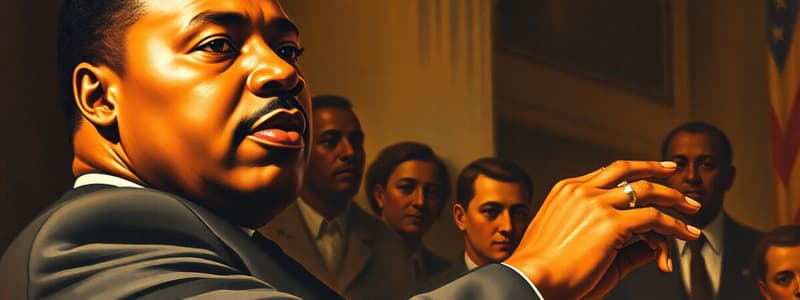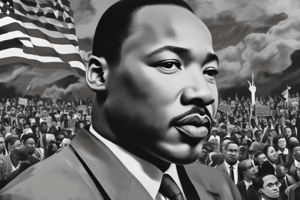Podcast
Questions and Answers
Which of the following best describes the initial career paths Martin Luther King Jr. considered before entering the ministry?
Which of the following best describes the initial career paths Martin Luther King Jr. considered before entering the ministry?
- Engineering and mathematics
- Politics and education
- Law and medicine (correct)
- Business and finance
What key event directly led to Martin Luther King Jr.'s involvement in the Montgomery bus boycott?
What key event directly led to Martin Luther King Jr.'s involvement in the Montgomery bus boycott?
- Formation of the SCLC
- The bombing of King's house
- Rosa Parks's arrest (correct)
- The Brown v. Board of Education decision
What was the primary role of churches within the Southern Christian Leadership Conference (SCLC)?
What was the primary role of churches within the Southern Christian Leadership Conference (SCLC)?
- To serve as organizing spaces for civil rights activism (correct)
- To provide financial support for civil rights activities
- To offer legal counsel to activists
- To lobby the government on behalf of the movement
In his "Letter from Birmingham Jail", what was Martin Luther King Jr.'s main criticism regarding white moderates?
In his "Letter from Birmingham Jail", what was Martin Luther King Jr.'s main criticism regarding white moderates?
What strategy did the SCLC adopt as a cornerstone of its activism, open to all regardless of race, religion, or background?
What strategy did the SCLC adopt as a cornerstone of its activism, open to all regardless of race, religion, or background?
How did the leadership approach of the SCLC differ from that of the Student Non-Violent Coordinating Committee (SNCC)?
How did the leadership approach of the SCLC differ from that of the Student Non-Violent Coordinating Committee (SNCC)?
Which of the following best describes the main goal of the Poor People's Campaign launched by the SCLC in 1967?
Which of the following best describes the main goal of the Poor People's Campaign launched by the SCLC in 1967?
What was Martin Luther King Jr.'s stance on the Vietnam War, and what impact did this have on his public image?
What was Martin Luther King Jr.'s stance on the Vietnam War, and what impact did this have on his public image?
What was Martin Luther King's view on the concept of freedom?
What was Martin Luther King's view on the concept of freedom?
What was the significance of the March on Selma in 1965, which involved both the SCLC and SNCC?
What was the significance of the March on Selma in 1965, which involved both the SCLC and SNCC?
Flashcards
Who was Martin Luther King Jr.?
Who was Martin Luther King Jr.?
A Baptist minister and civil rights activist, he led the SCLC and advocated for nonviolent resistance to achieve racial equality.
What is the SCLC?
What is the SCLC?
An organization formed in 1957 to coordinate civil rights activism using churches as organizing spaces.
What was Brown v. Board of Education
What was Brown v. Board of Education
Decision that led to unrest in Montgomery and ultimately sparked civil rights activism.
What was the Montgomery Bus Boycott?
What was the Montgomery Bus Boycott?
Signup and view all the flashcards
What is Letter from Birmingham Jail?
What is Letter from Birmingham Jail?
Signup and view all the flashcards
What was King's key assertion in Letter from Birmingham Jail?
What was King's key assertion in Letter from Birmingham Jail?
Signup and view all the flashcards
What was the Student Non-Violent Coordinating Committee (SNCC)?
What was the Student Non-Violent Coordinating Committee (SNCC)?
Signup and view all the flashcards
What are the Civil Rights Act of 1964 and the Voting Rights Act of 1965?
What are the Civil Rights Act of 1964 and the Voting Rights Act of 1965?
Signup and view all the flashcards
What was the Poor People's Campaign?
What was the Poor People's Campaign?
Signup and view all the flashcards
What did MLK call the U.S. government?
What did MLK call the U.S. government?
Signup and view all the flashcards
Study Notes
Overview of Martin Luther King Jr. and the Civil Rights Movement
- Dr. Martin Luther King Jr. is a symbol of peace, courage, sacrifice, and leadership in the civil rights movement.
- King worked with the Southern Christian Leadership Conference (SCLC) played a pivotal role in civil rights legislation from 1956 to 1968 .
Early Life and Education
- Martin Luther King Jr. was born in Atlanta, Georgia, in 1929.
- At 15, King entered Morehouse College, an HBCU, and pledged Alpha Phi Alpha fraternity.
- King initially studied law and medicine but was influenced by Dr. Benjamin Elijah Mays to follow ministry.
- He earned a bachelor's in theology from Crozer Theological Seminary and a Ph.D. in systematic theology from Boston University.
- While in Boston, he met and married Coretta Scott King.
Involvement in the Civil Rights Movement
- King became pastor at Dexter Avenue Baptist Church in Montgomery, Alabama.
- The Brown v. Board of Education decision desegregating schools led to unrest in Montgomery.
- Rosa Parks's arrest in 1955 sparked the Montgomery bus boycott, where King was chosen to lead the Montgomery Improvement Association.
Southern Christian Leadership Conference (SCLC)
- 60 black ministers and civil rights leaders formed the SCLC in January 1957 in Atlanta at Ebenezer Baptist Church.
- The SCLC used churches as organizing spaces for civil rights activism.
- Reverend Martin Luther King Jr. was selected as the first president of the SCLC.
- Reverend Ralph Abernathy Senior co-founded the SCLC and served as treasurer.
- Bayard Rustin, an advisor, helped King develop the non-violent rhetoric for the movement.
- The SCLC adopted non-violence as a cornerstone strategy open to all regardless of race, religion, or background.
Birmingham Campaign and "Letter from Birmingham Jail"
- King and the SCLC focused on Birmingham, Alabama, to end discriminatory practices, desegregate stores, and accelerate school desegregation.
- King was arrested after a Good Friday demonstration on April 12, 1963.
- While incarcerated, King wrote "Letter from Birmingham Jail" in response to criticism from eight white clergymen against his methods.
- In the letter, King defended the need for immediate action against injustice, stating, "Injustice anywhere is a threat to justice everywhere."
- King asserted that freedom is never voluntarily given by the oppressor; it must be demanded by the oppressed.
- He expressed disappointment with the white moderate, who he saw as more devoted to order than to justice.
Collaboration and Differences with SNCC
- The Student Non-Violent Coordinating Committee (SNCC) also worked for desegregation and racial equality.
- The SCLC focused on a charismatic leader, while SNCC emphasized group-centered leadership.
- Both organizations collaborated during the 1963 March on Washington for Jobs and Freedom.
- Their combined efforts in the 1965 march on Selma led to the signing of the Civil Rights Act of 1964 and the Voting Rights Act of 1965 by Lyndon B. Johnson.
Poor People's Campaign and King's Assassination
- The SCLC launched the Poor People's Campaign in 1967 to close the wealth gap between whites and blacks.
- King advocated for a guaranteed universal basic income and employment.
- Martin Luther King, Jr. was assassinated in Memphis, Tennessee, on April 4, 1968.
- The Poor People's Campaign collapsed after his death
Legacy and Later Years
- After King's death, the SCLC aided black voter registration and supported protests in the South.
- The Black Power movement gained traction, leading to disillusionment with non-violent protests.
- King's political views were more radical and expansive than often portrayed.
- He criticized the Vietnam War and American imperialism, calling the U.S. government "the greatest purveyor of violence in the world."
- Despite his current revered status, King was disapproved of by two-thirds of Americans in 1966.
Studying That Suits You
Use AI to generate personalized quizzes and flashcards to suit your learning preferences.




